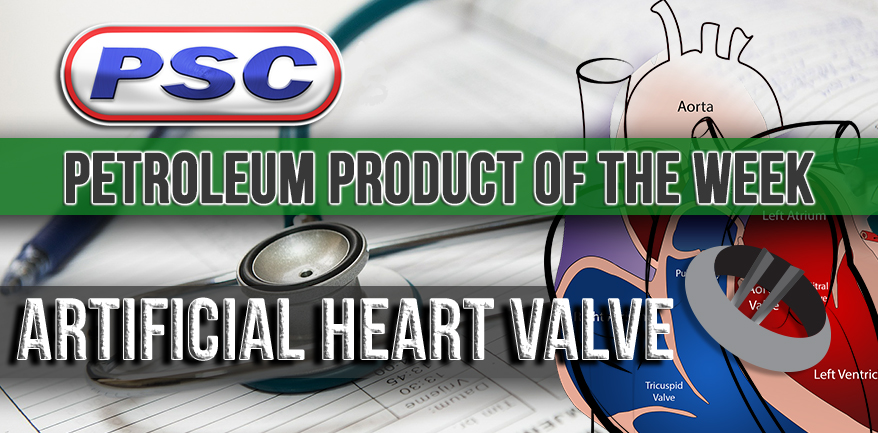Petroleum Product of the Week: Artificial Heart Valve
By on May 26 2017

Love is an open door-- literally.
Heart valves function like doors for blood to flow in and out. Like real doors, if a door into the heart is not opening or closing correctly then it could impact blood flow. This could cause real problems. Luckily, mankind worked to use available resources and found ways to invent artificial heart valves that can be put directly into the heart and control blood flow.

Petroleum is the heart of the healthcare industry.
Petroleum is in several areas of healthcare. The material is used to produce the computer holding patient information and the MRI machine detecting a brain tumor. Substances containing petroleum create anesthetics and stethoscopes. Petrochemicals even make up scrubs seen on nurses and surgeons alike. The hydrocarbon mixture is also key in manufacturing medical instruments such as IVs, pacemakers and artificial mechanical heart valves.
The heart is a fickle thing.
Approximately 265,000 heart valves are placed each year. Like any machine, a heart can undergo damage and need a part replaced. Heart valve surgery may be necessary for heart defects including chest pain, fainting spells and heart failure. The heart functions like a hydraulics system and quality valve function is essential for a healthy life.
Blood flowing out of the heart into large arteries must flow through a heart valve. There are four heart valves: aortic, mitral, tricuspid and pulmonic. The valve most commonly replaced is the aortic valve, and can be replaced with a biological or mechanical material. Mechanical material lasts the longest, but blood thinning medicine such as aspirin needs to be taken.
Don't miss a beat.
In 1952, the first mechanical heart valve replacement surgery took place. The valve had a caged ball design and was invented by Dr. Charles Hufnagel. As heart valve designs were altered, materials creating the valves were too. An electrical engineer named Miles Edwards founded American Edwards Laboratories, a medical device company, in the 1950s. He is credited with co-inventing the first artificial heart valve for commercial use.
Petrochemicals became part of the heart valve manufacturing process in 1965. Dr. J.C. Bokros from the General Atomic Company researched pyrolytic carbon materials for nuclear fuel. He discovered the same material could be used for heart valves and as a result, 90% of all mechanical heart valves have at least one pyrolytic part.
Show me what you're made of.
Mechanical heart valves are built of titanium, graphite, pyrolytic carbon and polyester. Derived from petroleum, pyrolytic carbon is coated onto the mineral graphite. The pyrolytic carbon coating is made from gaseous hydrocarbons that break down into carbon. Since the inner rings are made completely of pyrolytic carbon, it allows the material to be more crack resistant. Assembly must take place in a sterile environment to avoid contamination. Valves are ultimately placed into a rotator assembly used by surgeons to be implanted.
One type of heart valve called a bileaflet uses this material. Bileaflets are most popular because of exceptional central flow and it causes the least amount of blood damage. While artificial heart valves made of biological material such as tissue are prominent in the healthcare industry, 60% of heart valves placed each year are mechanical.
The future of mechanical heart valves includes bettering the overall function. Blood clots are still problematic and changes to valve design will decrease occurrences. There's a possibility that a valve flexible enough to open and close on its own will be invented. A type of valve that can do that will take away the need for blood thinners, and bring quality to the patient's overall experience.
Sources:
http://www.pages.drexel.edu/~nag38/History.html
https://www.ncbi.nlm.nih.gov/pmc/articles/PMC3154246/
http://www.madehow.com/Volume-6/Artificial-Heart-Valve.html
https://energyindepth.org/wp-content/uploads/2016/03/petroleum_hospital_v5-1.pdf






